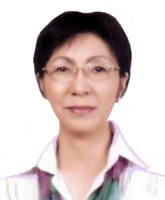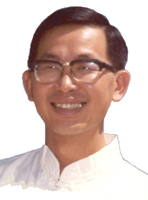
|
The Society of Folk Dance Historians (SFDH) Chang Ching-San and Chen Fang-Chih
[
Home |
About |
Encyclopedia | CLICK AN IMAGE TO ENLARGE |


|
BACKGROUND
Information: Chang Ching-San and Chen Fang-Chih, teachers of Taiwanese and Chinese dance.
Chang Ching-San (in Chinese tradition, the surname precedes the given name) was "Mr. Folk Dance" in Taiwan. Many of the half-million people dancing in Taiwan are directed by the teachers initially taught by Ching-shan and his wife Chen Fang-chih. Ching-shan traveled extensively in the United States, first teaching at Holiday Camp in Southern California, and later at other camps, introducing traditional and modern Chinese dances. He brought many noted international dance teachers to Taiwan, including Bruce Mitchell and Dick Oakes.
Chang was introduced to folk dancing in 1960 when, as president of his Hi-Y Club he attended workshops taught by Rickey Holden in Taiwan. He continued folk dancing in college, where his basketball coach, from Springfield College in Massachusetts, also taught dance. When the coach left he chose Chang to take over the teaching of folk dancing.
Chang graduated with a major in Atomic Physics. His government, at that point, asked him to teach folk dancing and recreational leadership rather than come to the United States for a Ph.D. in physics. Proud to be able to serve his country, he acquiesced.
From 1964, he directed folk dance leadership camps for teachers. the first camps were under the YMCA. From 1969, that work was under the sponsorship of the China Youth Corps.
In 1966, Chang began researching traditional Chinese dance movements and music, and in 1970 began teaching what he called "the new style Chinese folk dance." Before that time, Chinese folk dancing was stage dancing, done primarily by women.
Today, because of Chang's efforts, over 500,000 Taiwanese are doing Chinese folk dancing.
Ching-shan was the founder and organizer of the Asian Folk Dance Camp and translated many folk dances from English to Chinese.
Chang is the author of many books on Chinese folk dancing, songs, games, and recreation leadership. All the books published in Taiwan on these subjects have been written by him.
Chang Ching-shan died of cancer on September 6, 1984. Bruce Mitchell, working closely with Feng-chih, established a Chang Ching-shan Memorial Fund to provide a one-week all-camp-expenses-paid yearly scholarship for deserving Taiwanese folk dance teachers to the Stockton Folk Dance Camp.
Chen Fang-Chih was born in Japan of a Japanese mother and a Taiwanese father and educated in Taiwan. She started learning international folk dancing during high school and began to teach folk dancing in college.
She and Chang Ching-San met at a folk dance party in 1964 and they were married. She and her husband were invited to teach Taiwanese dances at Stockton Camp and at San Diego Camp. Fang-Chich was invited to teach folk dancing in Singapore and she was invited by the Japan Folkdance Federation to teach Taiwanese dances.
She is a graduate of a nursing school. She retired as a junior high school teacher in 2000 and became the chairperson of the promotional committee of International Folk Dance Association in 2001.
Fang-Chich serves as the artistic supervisor of Shiuan Ko Performing Group, the chairperson of Asia Folkdance Camp, and the chairperson of the board of directors of the Taiwan International Folkdance Association.
She continues to teach the dances of Taiwan, and has taught at the Stockton Folk Dance Camp. She also teaches the "new style" Chinese folk dance.
The Changs have two sons.
Dances Chang Ching-shan and Chen Fang-chih have taught include Baban Chen Jou Lung (Beautiful Lady of Da Ban City), Bay Nian (Making a Ceremonial Call on the Occasion of the New Year), Bu Eu Juh (Catch Fish), Chan Chai Kao Kang Shan (Stand on the Mountain, Chiao-Pi Chung-Tien-Jen (Naughty Farmer), Ching-Chun Wu Chu (Spring Song), Ching Shan Ching-Ko (Melody of Mountain and Sea), Chu Ku Wu (Dancing Song), Chu'un Yu, Diou Diou Dang, Gau Shan Ching (High Green Mountain), Hei! Hei! Hei!, Hei Sen Lin (Black Forest), Hsiao Hua Mao (Small Girl's Hat with Flowers), Huan-Le Ko Sheng (Happy Song), Jań Dzai Gau Gang Shang (Chinese New Year Medley Dance), Li-Chi Feng-Kuang (Li-Chi Scenery), Meng-Ku Mu-Ko (Pastoral of Mongolia), Meng-Ku Wu Chu (Mongolian Dancing Song), Mi Mi Mi Gu, Miao Jia Wia (Miao's Moon), Mountain Moon Dance, Mu Ching (Dear Heart), Na Lhu Uan (I Love You, How are You?, Good Bye, or Take Care), Niu Li Ko, Shan Hai Sheng Ping, San Yueh Tao Hua (March of the Peach Blossoms), Shih Hai Sheng Ping, Shih-Wai Tou-Yuan (Beautiful Dream World), Shih Wu (Lion Dance), Shou-Huo Chi-Chih Yeh (Harvest Season Dance), Tae Shi Gua (Picking Watermelons), Tao Hua Kuo Do (Peach Blossom is On the Ferry), T'Sai Cha Wu (Pick Tea Leaves), Tsae Shi Gua (Picking Watermelons), Tai Fu Ch'uan (Tai Fu Ship), Tai-Wan Hau (Beautiful Taiwan), Tao Hua Kuo Do (Your Youth is Over), and Ying Pin (Bin) Wu (Dance of Welcome).
This page © 2018 by Ron Houston.
Please do not copy any part of this page without including this copyright notice.
Please do not copy small portions out of context.
Please do not copy large portions without permission from Ron Houston.